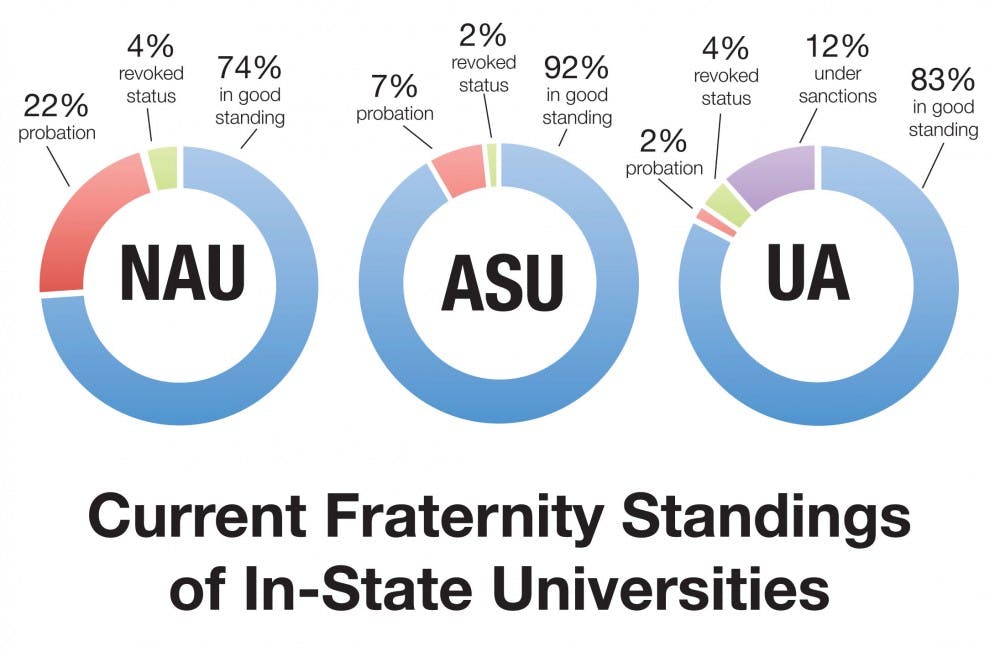 (Graphic by Shelby Slade)
(Graphic by Shelby Slade)Fraternities have long been known for crimes committed by members: the underage drinking, member deaths and subsequent discipline. However, only a tiny percentage of ASU fraternities have been called out for violating University policy, a new study shows.
A new database by the Arizona Republic released Monday suggested fraternity violence, crime and hazing is not on the rise as many would think.
Business and psychology senior Xander Mach, president of the Multicultural Greek Council, said recent media coverage has brought many violations into the public eye, which creates incorrect perception of fraternities.
"I definitely think (extreme cases of fraternity violence and alcohol abuse) have a very negative impact on the image of fraternity and sorority life on campus, and it is really unfortunate, because behind it all, a lot of Greek organizations have really good images, and a few members can kind of destroy the image for everyone else," he said.
There are 60 fraternities associated with the University. Of these, 55 are in good standing, four are on probation and one has had its recognition revoked, according to the database.
This data shows that approximately 92 percent of ASU's fraternities have had no violations that could cause them to lose privileges.
At UA, only 43 of 52 fraternities, or approximately 83 percent, are in good standing, Of NAU's 23 fraternities, 17, or 74 percent, are in good standing.
"Fraternities and sororities are student organizations and they are obligated to abide by ASU's policies, as well as their own national policies, and the policies of fraternity and sorority life which are another office within ASU," Mach said.
The Arizona Board of Regents created the Student Code of Conduct, which ASU has adopted as its requirements for student organizations.
New regulations about Greek life limit the number of social programs fraternities and sororities can hold to eight throughout the semester, ASU spokeswoman Julie Newberg said in an email.
Also, fraternity and sorority leaders are required to take risk management courses before they can hold these events.
The Student Code of Conduct states student organizations and their leaders can be held responsible for misconduct, including underage drinking, hazing and criminal offenses, on campus or at University-sponsored events.
When any student organization violates the code of conduct, the Office of Student Rights and Responsibilities determines the proper sanctions for the misconduct, Newberg said.
Responses to violation can include having their status revoked, being placed on probation, receiving a warning or being asked to attend classes, according to the Student Code of Conduct.
Between 2008 and 2013, 14 ASU fraternities have had violations of the student organization agreement, but the other 46 had never received a citation for such violations.
Of these violations for behavior, including endangerment of members, underage drinking and hazing, nine were given out in the 2012-13 school year.
While this is an increase, from the two violations noted in the 2011-12 and 2010-11 school years, fraternities had seven violations in the 2009-10 school year and six in the 2008-09 year.
"I can't really comment about the hard facts of it all, but, to me, it really seems like it's less of an increase and more just an increase of awareness," Mach said. "But a lot of people are becoming more aware of this issue, aware of their safety and aware that they don't have to be involved with student clubs. They are more likely to report instances of dangerous activity."
Tempe Chief of Police Tom Ryff said police receive many calls about loud parties and arrest or cite a lot of people for DUIs or underage drinking in the area around ASU as part of Operation Safe and Sober.
While Tempe Police does not track calls related to students, fraternity-related incidents are often behaviors of those individuals involved, instead of the fraternity as a whole, Ryff said.
"The fact of the matter is we are dealing with behavior, and, unfortunately, some of the behaviors we have been dealing with both the suspects and the victims have been involved with fraternities," he said. "Really what we are dealing with is youth and individuals, whether they are fraternity members or not."
Mach said while many have bad perceptions of fraternities, they create friendships and connections that will last beyond college.
"I think fraternity and sorority life gets a bad rap, which is really unfortunate because realistically these organizations ... are places where you can be yourself and meet people with your interests, your values and form these life-long relationships," he said.
Reach the reporter at sgslade@asu.edu or follow her on Twitter @shelbygslade




